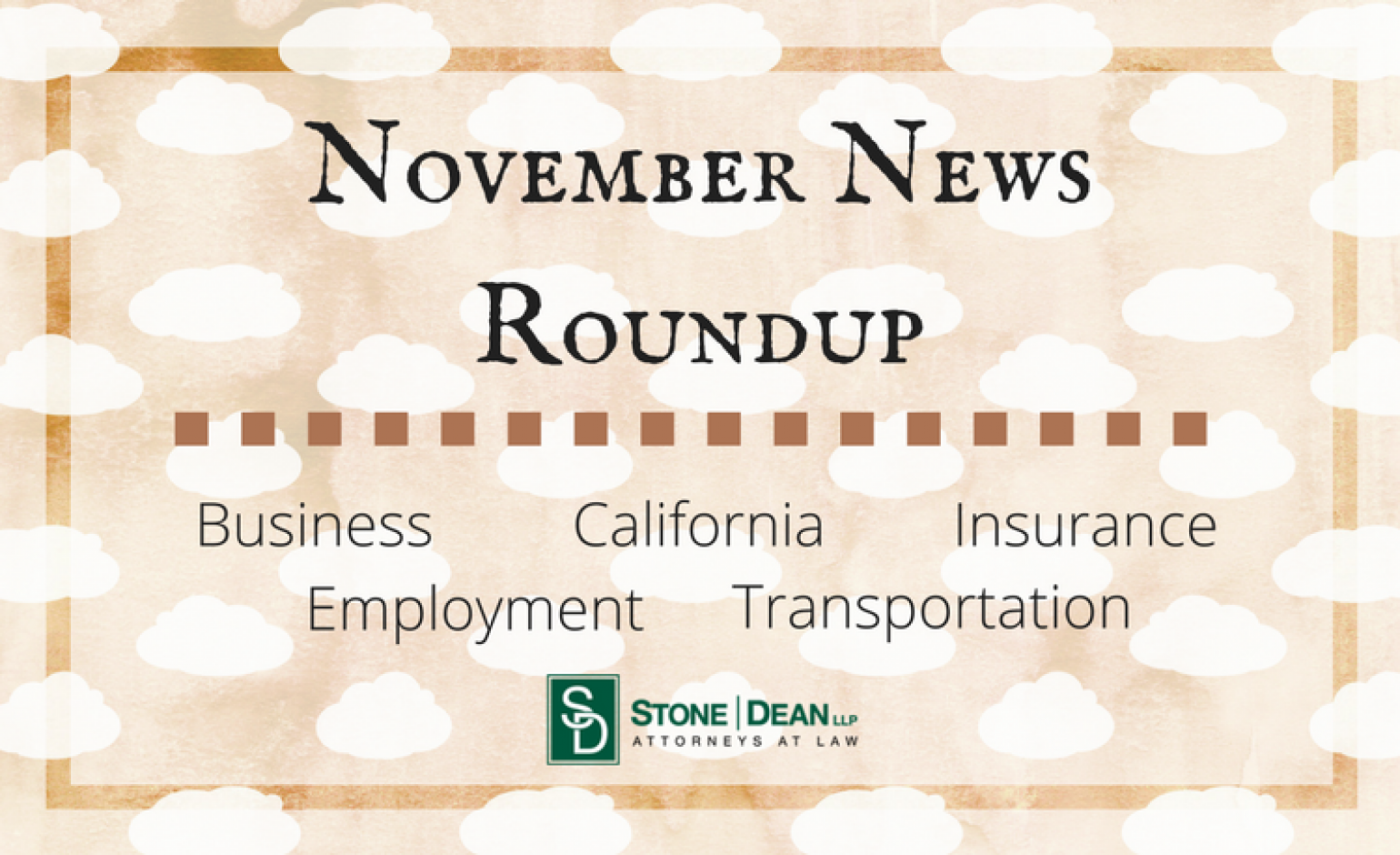November News Update — California, Employment, Business, Insurance, Transportation
November’s trending legal updates, court decisions, and important news in California, Employment, Business, Insurance, and Transportation.
California Law
- Victims of the deadly California wildfires that killed at least 43 people and caused billions of dollars in property damage are suing the utility company Pacific Gas & Electric Co. (PG&E) citing negligence.
‘What we need to consider here is, these people are innocent victims,’ Attorney Steve Campora said. ‘They do nothing to contribute to the injuries or damage they sustained there in the sanctuary of their own homes, and they’re subjected to explosions and fire. I have a real problem with that.‘
- A new California law has banned the sale of dogs, cats, and bunnies bred in puppy mills. All pet stores are now required to only sell rescue animals. California is the first state to pass a law of this nature, and other states are expected to follow
The revised restrictions — set to take effect January 1, 2019 — will require pet store owners to sell dogs, cats and rabbits from animal shelters, rescue groups or adoption centers. According to the legislation signed by Gov. Jerry Brown Friday, stores could receive fines of $500 for the sale of an animal that is not a rescue.
- California’s tough vaccine law, which requires children to be vaccinated to attend school, isn’t tough enough according to some physicians. Written medical exemptions provided by doctors to avoid vaccinations are on the rise.
In the 2016 school year, 2,850 children received medical exemptions that would keep them in school without vaccinations. That’s triple what it was before the vaccine law went into effect.
Employment Law
- The ever-changing field of employment law is about to change more. In 2018, new laws such as “ban the box” and expanded retaliation protections for whistleblowers will take effect. The National Law review provides a comprehensive summary of the new laws.
Governor Jerry Brown signed several laws in 2017 that will impact California employers next year.
- Indefinite leave does not need to be provided to employees by employers for temporary disability claims, according to the Eleventh Circuit Court of Appeals.
Last month, the Eleventh Circuit Court of Appeals refused to create an exception to this rule where the claimed disability involved a temporary as opposed to a permanent medical condition.
- Santa Monica announces first successful minimum wage prosecution of JW Marriot Boutique Gift Shop “La Boutique.”
‘It is paramount in each of our wage enforcement cases that the affected employees receive full restitution for their back wages and that the employer is educated about the City’s wage laws. This prosecution successfully achieved both results.‘
- California Businesses reportedly left two-thirds of available CA Job Tax credits unclaimed, leaving Jerry Brown’s signature jobs initiative largely unfulfilled.
California Competes was started in 2014 to help businesses stay in the state by offering tax credits based on the number of full-time jobs they create and how much a company seeks. Credits typically amount to several thousand dollars per new job. So far, the Governor’s Office of Business and Economic Development, known as GO-Biz, has awarded $622.8 million to 865 companies.
Insurance Law
- The slew of natural disasters this year is proving costly for the insurance industry.
Adding the California wildfires to hurricanes Harvey, Irma and Maria will make 2017 one of the costliest catastrophe loss years in U.S. history, with insured losses reaching $70 billion to $100 billion according to various estimates.
- Jaime Rosario Del Real and his son Israel Del Real, owners of Del Real Packing, LLC, were sentenced for denying workers’ compensation insurance and medical coverage to employees injured on the job and keeping the money for themselves. They were sentenced to jail time, probation, and ordered to pay restitution to the victims.
The investigation also revealed that over a five year period, the Del Reals lied more than 20 times in order to obtain reduced insurance premiums. As part of their premium theft the Del Reals kept two sets of Employment Development Division (EDD) forms, with different employees and a different number of employees listed, which allowed the Del Reals to evade paying payroll taxes.
- CVS agrees to buy Aetna for $69 Billion, combining two of the largest players in the healthcare industry.
Together, the companies touch most of the basic health services that people regularly use, providing an opportunity to benefit consumers. CVS operates a chain of pharmacies and retail clinics that could be used by Aetna to provide care directly to patients, while the merged company could be better able to offer employers one-stop shopping for health insurance for their workers.
Business News
- Uber is being faced with a fresh lawsuit that asserts the popular ride-sharing company is not doing its due diligence in screening drivers and protecting passengers from being assaulted by drivers.
The legal complaint, filed by Wigdor LLP on behalf of two plaintiffs, alleges that ‘thousands of female passengers have endured unlawful conduct by their Uber drivers including rape, sexual assault, physical violence and gender-motivated harassment.‘
- Monsanto and farmers that use their products are fighting California on required cancer-warning labels for products that contain glyphosate, citing there is not enough evidence that glyphosate causes cancer.
‘Such warnings would equate to compelled false speech, directly violate the First Amendment, and generate unwarranted public concern and confusion,’ Scott Partridge, Monsanto’s vice president of global strategy, said in a statement.
- On January 1st, 2018, the sale and use of recreational marijuana will be legal in California. Regulations and laws have been established, but lawmakers understand that the unprecedented nature of the legalization of marijuana will lead to many amendments and changes as issues arise.
‘The rulebook gives aspiring and established marijuana businesses their first look at 276 pages of regulations they must abide by come Jan. 1, when the state will start issuing licenses for the multibillion-dollar industry and allowing recreational pot sales to start for the first time.‘
- Disneyland has halted sales of its popular Southern California Annual Pass, which allows pass-holders access to Disneyland year round, excluding certain dates.
‘With many new attractions coming, it appears Disneyland officials are taking steps to spread out the demand.‘
Transportation
- Drivers, Owners, and Operators begin “Media Blitz” to spread awareness of proposal to stall new ELD Mandates, two weeks before it’s set to take effect.
’We want to make people understand that [the ELD mandate] puts a lot of pressure on the driver because now he is on a clock,’ said Hasner. ‘And, when that clock expires, he goes into violation and that comes with a large fine. That’s pressure – a lot of pressure.’




